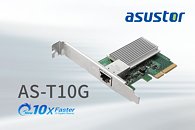Raevenlord
News Editor
- Joined
- Aug 12, 2016
- Messages
- 3,755 (1.15/day)
- Location
- Portugal
| System Name | The Ryzening |
|---|---|
| Processor | AMD Ryzen 9 5900X |
| Motherboard | MSI X570 MAG TOMAHAWK |
| Cooling | Lian Li Galahad 360mm AIO |
| Memory | 32 GB G.Skill Trident Z F4-3733 (4x 8 GB) |
| Video Card(s) | Gigabyte RTX 3070 Ti |
| Storage | Boot: Transcend MTE220S 2TB, Kintson A2000 1TB, Seagate Firewolf Pro 14 TB |
| Display(s) | Acer Nitro VG270UP (1440p 144 Hz IPS) |
| Case | Lian Li O11DX Dynamic White |
| Audio Device(s) | iFi Audio Zen DAC |
| Power Supply | Seasonic Focus+ 750 W |
| Mouse | Cooler Master Masterkeys Lite L |
| Keyboard | Cooler Master Masterkeys Lite L |
| Software | Windows 10 x64 |
ASUSTOR Inc. has launched the AS-T10G 10G Base-T network card to provide customers with the ability to upgrade their devices to the fastest speeds available for consumers. The AS-T10G supports 10GbE speeds and is backwards compatible with 5GbE, 2.5GbE, 1GbE and 100MbE speeds while sporting an RJ-45 port. ASUSTOR ADM, Windows, Linux, Mac OS and VMware ESXi are all supported, allowing flexible installations.

The AS-T10G is pre-installed with a full-height bracket and comes with a half-height bracket for easy installation in thin computers. The ASUSTOR NAS bracket for the AS7008T and AS7010T can be purchased separately to upgrade to 10GbE speeds. ASUSTOR offers a variety of 10GbE NAS, including, but not limited to the AS4002T, AS4004T, AS7008T, AS7010T, AS7009RDX and the AS7012RDX, allowing workstations and ASUSTOR NAS devices to communicate at ever higher speeds, no matter the budget.
AS-T10G Specifications:
Supports:
Supported standards:
Specifications
Operating System Support:
Size: 82 x 62 x 13 mm
View at TechPowerUp Main Site

The AS-T10G is pre-installed with a full-height bracket and comes with a half-height bracket for easy installation in thin computers. The ASUSTOR NAS bracket for the AS7008T and AS7010T can be purchased separately to upgrade to 10GbE speeds. ASUSTOR offers a variety of 10GbE NAS, including, but not limited to the AS4002T, AS4004T, AS7008T, AS7010T, AS7009RDX and the AS7012RDX, allowing workstations and ASUSTOR NAS devices to communicate at ever higher speeds, no matter the budget.
AS-T10G Specifications:
Supports:
- 16KB Frames
- IEEE 802.3x Ethernet Flow Control
- IP, TCP, UDP checksum offloading
- Supports 100MbE, 1GbE, 2.5GbE, 5Gb/s and 10GbE speeds
- 802.1Q Virtual LAN (VLAN) tagging
Supported standards:
- IEEE 802.3ae: 10-Gigabit Ethernet
- IEEE 802.3x: Ethernet Flow Control
- IEEE 802.2ad: Link Aggregation
- IEEE 802.1Q VLAN
- RFC2819 RMON MIB
Specifications
- Maximum speed:10 Gbps
- Duplex Mode: Full Duplex
- Interface: PCIe 2.0 x4
Operating System Support:
- Windows 7 and above (32/64-bit)
- Windows Server 2012 and above (32/64-bit)
- Linux 2.6.x and above (32/64-bit)
- MacOS 10.10 and above
- VMware ESXi 5.1 and above, Microsoft Hyper-V, Linux KVM, Oracle VirtualBox
Size: 82 x 62 x 13 mm
View at TechPowerUp Main Site




